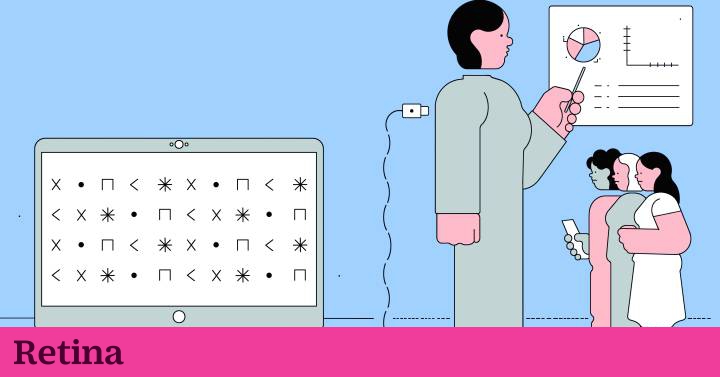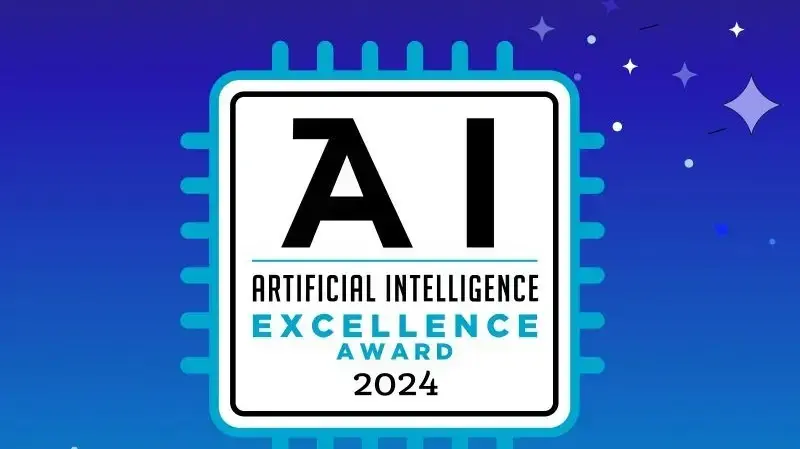In Greek mythology there were the Argos Panoptes, giants with a hundred eyes that saw everything. That one hundred views view would be comparable today to the use of artificial intelligence, machine learning, algorithms, neural networks or automation in business management. It is the closest thing to a robot boss. But the paradox, or not, is that the use of these tools does not guarantee a better leader. There are thousands of ways, for example, that algorithms in the hands of bad managers can do more harm than good. You just have to remember the myth of Argos. Warehouse sensors can be used to monitor the work rate and warn a worker that it takes "too long" to stack a shelf. Imagine, too, an algorithm that sends a message to colleagues when someone is five minutes late. Or, for example, alerts futurologist Mike Walsh, a mechanism that constantly adjusts the color temperature of office light so workers' circadian rhythms think it's late afternoon instead of morning. Exaggerated?
IBM receives more than 8,000 resumes a day. It has developed an artificial intelligence system that predicts with 95% accuracy the employees who will leave the company. The former CEO of the company, Ginni Rometty, assured that it supposed a saving of 300 million dollars. This sequence of numbers controls the remuneration, the assignment of tasks, the work rate, the results. Above all, it dominates time.
“There is no pause: everything is speed. Management is based on speed, immediacy, the absence of reflection. This has to end, ”says the philosopher María Ángeles Quesada, who works with ING, Enagás and Solán de Cabras. “They are companies that are looking for a way to stop and reflect on the ethical implications of all this change. They are committed to digital transformation. But also with critical thinking and with a hybrid model, which leads the worker to not always be at home or in the office ”.
“Amazon workers know how impossible it is to keep up with artificial intelligence. A report revealed that most had injuries due to the speed of work. Digital bosses are making employment miserable. ”
The rapidity of change is causing managers to be unable to understand the new tools and their scope. The PhD in mathematics from the University of Havard Cathy O'Neil (Cambridge, 1972) wrote in his book Weapons of Math Destruction ( Weapons of Math Destruction ) how a control algorithm used by the Department of Education in New York a year gave to the same teacher a rating of 6/100 and to the next, of 96/100, without anything justifying the change.
The concern is deep. The worker feels the fragility of the Murano glass on his skin and has become transparent in front of those responsible for the company. "With a digital boss who monitors you every few seconds, there is no place for the human being," says Gabrielle Rejouis, an expert at the Center for Technology and Privacy at Georgetown Law University. And she specifies: “By the time you have completed one task, you are already waiting for the next one. Amazon workers know perfectly well how impossible it is to keep up with artificial intelligence. A report by the National Employment Law Project organization revealed that most of its employees had similar injuries due to the speed of work. Digital bosses are making employment miserable. ”
Few companies like the one founded by Jeff Bezos push this trend to the limit. Amazon uses complex algorithms to determine the productivity of its processing centers and can automatically generate the necessary paperwork - as The Verge discovered and collected in The New York Times - to fire workers who do not meet their objectives, without the intervention of any human being. The company replied that there was one person at the end of the process. But the truth is that the gun with which the operators read the codes serves Bezos to control productivity.
That is the certainty of an algorithm that pushes the human being towards the cliff. “Algorithmic management, the robot boss, has very little benefit for workers. It can make working hours more flexible, but it allows managers and executives to hide behind technology and take no responsibility for their actions, ”says Charles Luke, assistant professor at the University of Western Ontario (Canada).
"The most troubling thing about robotic management is that there is no way to argue with a robot boss, even when he's wrong."
Digital supervision
Argos's hundred eyes do not rest. They take their gaze everywhere. Cogito (an AI-focused Boston startup that has declined to speak for this report) has a system installed in 200,000 clients, including insurance company MetLife. With it, she warns the worker, through a small blue box, in the lower right corner of the computer screen, about whether, for example, she is answering the client too quickly or too slowly.
- Do you sound asleep? - Throws the box.
The software sends the image of a cup of coffee.
The goal, as explained in The New York Times, Joshua Feast, CEO of Cogito, is to make workers more effective and give them information in real time. Executives think ("I think" is, by the way, the meaning of the term cogito in Latin) about worker errors. But what about machine failures? "The most worrying thing about robotic management is that there is no way to argue with a robot boss, even when he is wrong," says Jules Kingaby, an expert at consultancy Flux Trends Analysis.
The problem is that everything is so new that many things do not have names and you have to point them with your finger. And the results are, sometimes, an injustice. The technology firm HireVue has designed a personnel recruitment system through a mobile camera or computer that analyzes facial movements and body language to accept or reject the candidate. "It is deeply worrisome to develop a technology that differentiates between a productive worker and another who is not a function of the expressions on her face," criticizes Meredith Whittaker, co-founder of the New York center AI Now Institute. "It is pseudoscience. It is a license to discriminate ”.
Uber: A first warning
Ethnographer Alex Rosenblat (author of Uberland: How Algorithms Are Rewriting the Rules of Work ) and Charles Luke were the first to demonstrate in 2016 to what extent an algorithm is a breathtaking boss. They showed how the Uber applications launched an attractive message accompanied by a price increase icon: “Are you sure you want to go offl ine? Demand is very high in your area. Make more money, don't stop now! ”. Something like ... "Are you sure you want to disconnect? Demand is very high in your area. Make more money, don't stop now! ”
It is a game, but with human beings. “Experts call it gamification and it is the reward-reward technique that video games used a decade ago. A way to control large groups of workers without making it seem so, ”says the director of a Spanish technology company who asks for anonymity. An Uber algorithm can distinguish whether the driver accelerates too much or too little, analyze customer satisfaction or whether the professional drives more or less skillfully through certain streets. This information hit over and over again is gold for the company. "Employers have an insatiable appetite for information about their workers, whether relevant or not," said Lewis Maltby, head of The National Workrights Institute, a US organization dedicated to improving legal protection for workers.
This algorithm-based management is not a new concept. At the beginning of the 20th century, Frederick Winslow Taylor revolutionized the world of production ( The Principles of Scientific Management , from 1911) with his theory of scientific management. The principle was to squeeze inefficiencies from factories by timing and measuring every aspect of work. These days, Uber, Lyft, and other on-demand platforms have done billions by outsourcing basic human resource tasks to computers: payroll, job scheduling, performance appraisal, and more.
Modern times
Perhaps we do not live in a neo-Taylorism (or yes), but what is undeniable is that they are Dickensian days. "It was the best of times, it was the worst of times, the age of wisdom and also of madness." Erik Brynjolfsson and Andrew McAfee of MIT have shown how technological progress fractures society. “There has never been a better time to be an advanced knowledge worker. Conversely, there has never been a worse time for employees who only have normal skills. Because robots and computers will acquire these skills at extraordinary rates, "they narrate. The algorithms are going to recruit, analyze digital reputation, validate productivity, promote —or not— workers, set their wages.
This social model, which spills like water on the edge of an infinity pool, is well defined by Marc Vidal, an expert in technological transformation: "It is the economy of little contact." That social distance is brought by robots through a myriad of algorithms in that numerical sea that is artificial intelligence.
"The CEO, the boss, will be able to analyze thousands of data, but under what criteria: an ethical screen is required," emphasizes Vidal. There are programs that are already capable of establishing your mood according to how you type the computer that day. Control only has the limits that man wants to set. Technology brings a land of winners and losers without exclusions; without dikes.
"The biggest victim is privacy," warns Lewis Maltby. “You don't have privacy on your boss's computer. Any email you send, every website you visit, every word you type, is an open book for your director. Virtually every large American company conducts some form of electronic surveillance. ” But Spanish legislation on this is more guaranteeful than that of the United States.
The General Data Protection Regulation (RGPD) has been a firewall against defenselessness. The problem is that technology is always ahead of regulations. "So much so that in some collective negotiations it will be necessary to take algorithms into account," predicts Jesús Mercader, professor of Labor Law at the Carlos III University.
“Any email you send, every word you type, is an open book for your director. Virtually every large American company conducts some form of electronic surveillance. ”
Can you imagine it? Negotiate with mathematical series? Seen from the other side —where the ocean is so strange that it lacks shore— "some of the traditional formulas of business power are being replaced," says Jesús Mercader. Any businessman who does not want to be excluded from his time now embraces technological responsibility. With similar sincerity with which you previously sold corporate social responsibility (CSR) on the board of directors, whose destination was a series of digital and paper reports that have had the value of the weight of straw?
Digital rights
For this reason, the Secretary of State for Digitization and Artificial Intelligence is working on a Charter of Digital Rights. "And is that the ethical debate that underlies all technological applications becomes particularly relevant with AI applied to business, given the enormous potential that this technology has to do things well but also badly", assumes Guillermo Tena Planas, director of the Cuatrecasas Institute of Legal Strategy in Human Resources.
The challenges that await their turn in the robot boss revolution seem closer to Dickens than to Taylorism. “We owned everything, but we had nothing; We went straight to heaven and went astray on the opposite path, ”wrote the novelist. Because the questions jump like polished bronze chips on a lathe. Will those who have a physical and a virtual boss earn the same? Will schools teach how to work for a robot director? Will the privileged have a tangible boss and the precarious (this whole universe, for example, of delivery men), a digital one? Will work become less human? Will younger generations accept this type of boss?
The problem is complex because it is unfair even when the math is "accurate." “A very clear example is sexism in hiring. If you use a system that is predictively accurate, you are going to penalize women because they are already penalized by the company. The problem is not really the selection, it is the organization. You have to do something to make it less sexist. And part of doing something is training your algorithm to be different from what it is, "says Daniel Kahneman, Nobel Prize winner in Economics and one of the world's experts on discrimination.
Some responses mature on their own. The dehumanization of work does not need technology. This is demonstrated by economic history. “The massive use of temporary hiring has been a very important step in dehumanizing employment. A third of Spanish workers (especially young people, women and immigrants) end their employment relationship without dismissal, without justification; temporality is only real in 20% of contracts, the rest is fragmentation of activity. There is no difference between whether this is done by a machine or by regulation; the dehumanization of employment does not require the assistance of a robot ”, says Carlos Martín, head of the Economic Cabinet of CC OO. But he adds a breeze of hope: "The good news is that machines must free us from routine work and this productive improvement would have to be distributed through a cut in the working day."
Technological determinism
It is impossible to deny the bright side of AI or algorithms. But the challenge is that no one is left behind and that all workers have decent working conditions. Harvard researchers have found that high-precision algorithms can read cancer diagnostic scanners with 92% certainty against 96% of the best doctors in the country. "Very good. But we must not fall into the trap of technological determinism. We humans decide how far we consent to technology. Just because something is technologically possible does not mean we should allow it, ”says technologist Enrique Dans.
"It is important not to fall into the trap of the exceptional circumstances that technology imposes: we must ensure that there are rules created by us."
However, certain parts of the future - he predicts - are non-negotiable: "Working for algorithms will be something to train". Emerging companies, software vendors, and consultants compete to offer solutions that bring automated management decisions to the entire enterprise architecture. "Freelance technology platforms are proliferating with remotely employed employees who have hourly earnings well above the national wage average," observes Jaime Sol, partner in charge of EY's People Advisory Services. Professionals wanted with the shortage of musk.
"Highly skilled freelancers are a growing source of talent that will cover part of the future job", summarizes Cristina Hebrero Rodríguez, head of People & Change at KPMG in Spain. Perhaps Covid-19 had spread the dystopia before the virus even spread. A global study from last year by Oracle and the Future Workplace revealed that 64% of those interviewed trusted a robot boss more than a human one. Well, AI has, well used, its own ecosystem.
In subtle and complex decisions, which require human contact and finesse, there is an opportunity to take advantage of algorithms in order to increase the talent of the workers in a combined way. Not in isolation. "In other words, instead of using algorithms as surveillance weapons, you can use them to improve company culture," explains Mike Walsh. This is a slide of tomorrow. There are others.
The implementation of AI —including robots— will contribute 15.7 trillion dollars to the planet's wealth in 2030. It is tempting to write: "If nobody prevents it". “Because insecurity will increase between those who have a physical and a digital boss. Since the most creative works will be on the physical side. There is a real risk that a gap will open up leading to discrimination, ”warns OuiShare network co-founder Albert Cañigueral. In technological terms, "young generations are not aware of what is coming upon us," warns Diego Vizcaíno, partner at Analistas Financieros Internacionales (AFI).
A matter of ethics
In a 1962 speech, held in the John Fitzgerald Kennedy Library, the American president warned that maintaining full employment was "the greatest challenge in the country when automation was replacing man." Algorithms, AI, and machine learning are not bad per se. They free from repetitive tasks, avoid discrimination when it comes to establishing salaries or bonuses and, together with the human being, they can work at the same time on complex and subtle decisions that require human contact and delicacy. But they demand a moral sense. “A machine boss must respect the same obligations as a human boss, and maintain identical ethical guidelines. Obey the law, help employees maximize their performance and help your team enjoy their work "summarizes Calum Chace, philosopher, British writer and author of Surviving AI ( Surviving artificial intelligence ). At the other extreme, the system becomes a problem when "ethical or governance rules are not followed," says Foteini Agrafioti, head of the Borealis AI technology company.
Like it or not, the roots of the future are taking root. State-of-the-art algorithms and surveillance systems will be common in 2040. There is already software that seamlessly controls how workers in the company interact. Humanyze, a company chaired and co-founded by Ben Waber at the MIT Media Lab, monitors workers' emails and messages on platforms to understand how people communicate. Some employees even wear digital badges that connect to one another within the office. Humanyze insists that identities are anonymous. The worker knows that someone from the marketing department has written to someone from the sales area. But nothing else. Only one alphanumeric code is visible. "In our research at MIT we discovered that having a good ethical policy does not compromise the results of any organization's analysis," reflects Ben Waber. "In other words, you don't need to have access to the person's personal or private information."
But using AI or any of its variants to manage the work of people in their working hours, despite good intentions, is a risk and is uncertain. Technology travels close to the speed of light. The regulation that should regulate it, on the other hand, respects the prohibition of 90 kilometers per hour. Critics see algorithms as a way to dehumanize jobs, cause stress, and unfairly punish workers. Entrepreneurs feel in AI the new "business purpose" to maximize profits. A capitalism built on mathematics.
In fact, the crisis has accelerated algorithmic management. “It is reaching everywhere. Offices, schools, universities, professional services companies ”, narrates Jeremias Adams-Prassl, Professor of Law at the University of Oxford. "But looking to the future, the most important thing is not to fall into the trap of the exceptional circumstances that technology imposes: we must make sure that there are rules created by us and that they are applied consistently." Because if entrepreneurs are tempted to push artificial intelligence to the limit of human rights, it will not be robots that rebel.
When the robot knocks on the door of the board of directors
The economist Guillermo de la Dehesa has been a director (among other companies) of Banco Santander and Amadeus. Professor Emilio Ontiveros in economics sits, for example, at Mutua Madrileña, Iberdrola Spain or Torreal. “A counselor knows nothing of big data. It does not have great technological literacy ”, warns Ontiveros. “But this does not mean that technology and robots are not increasingly important in decision-making. In the marketing of a product, in the marketing strategy, when it comes to understanding the customer. Robots are present in the councils, "stresses the comedian.
They are already there. Alive. Reading society, business and the world ”. But they don't make the final decisions. "That is still the space of the human being", defends Ontiveros. No one else's. "Artificial intelligence tends to replace individuals, but these promising technologies will not end up being as efficient as the brains of intelligent people," ditch Guillermo de la Dehesa.
We present below the reflections regarding the heads of some large companies.
Gonzalo Sánchez, president of PwC.
"Algorithms and artificial intelligence cannot replace the reflection and assessment of the directors, but they will be a very relevant aid for decision-making, especially in compliance, strategy and resource management."
María Dolores Dancausa, CEO of Bankinter.
“Artificial intelligence has become one of the great fields of knowledge and will bring radical changes in the way we relate to the world in the short and medium term. And this will apply both in our daily life and in all economic fields and business sectors.
Within AI, a science that emerged just ten or fifteen years ago, such as data analysis, is becoming increasingly relevant. Based on the analysis and processing of huge data sets, the ability to predict and be successful in decision-making, whether political or business, will experience remarkable progress. In this sense, I am sure that we will see an increasing use of its capabilities at the managerial levels of companies that will even allow part of the decision-making to be automated. But, of course, always on the basis that although the opportunities offered by these technologies are almost endless, so are their risks, so it is the duty and responsibility of the managers to identify and mitigate them, and that their application is always carried out. carried out responsibly and without negative impact on people.
Ultimately, the combination of sensitivity, responsibility and human intuition with the processing capacity of these systems will exponentially increase the levels of managerial success ".
Hilario Albarracín, President of KPMG.
“Artificial intelligence will occupy more and more space in the management of companies as a support for decision-making thanks to its massive data analysis capabilities and the preparation of predictions, behaviors or risks, among others. However, for this to happen, managers and directors need to understand and explain how and why the algorithms reach certain conclusions and ensure that they conform to ethical frameworks of conduct. ”
José Luis Flórez, CEO of Plaiground, Artificial Intelligence company of Minsait (Indra).
“Artificial intelligence will occupy more and more space in the management of companies as a support for decision-making thanks to its massive data analysis capabilities and the preparation of predictions, behaviors or risks, among others. However, for this to happen, managers and directors need to understand and explain how and why the algorithms reach certain conclusions and ensure that they conform to ethical frameworks of conduct. ”
“Whoever imagines that due to the emergence of big data and artificial intelligence, a company's management committees or boards of directors look like a war room, with a lot of monitors displaying information on the company's progress, possibly would be disappointed to see reality. This does not imply that the impact of technology has been small.
The main contribution of data analysis technologies has been the ability to measure practically all decision areas, allowing questions that were far from it to be translated into economic-financial language: how to develop a consistent, pleasant and effective customer experience, how evolve products, how to value the actions of my competitors, what is the consequence of employees working in a comfortable environment, making them participate in the success of the company ... ".









